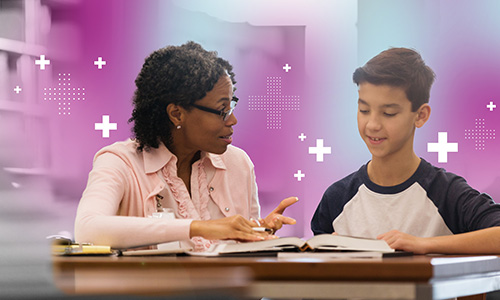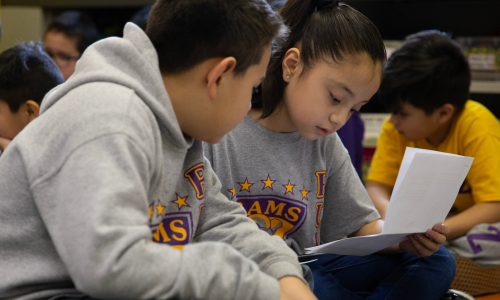
School counselors have a unique role to fill while schools are shut down due to COVID-19 and, like teachers, they may still be adjusting to their new normal and trying to figure out the best way to help students.
Because so much of what counselors do revolves around face-to-face contact, making the transition to this new virtual climate is uncharted territory. However, every counselor I know is devoted to helping students and removing the obstacles that can cause barriers to learning. That doesn’t change, even when that environment may look very different.
Here are some ways counselors can support students and others during these uncertain times.
How to support students
As a school counselor, I sometimes worried about students during long stretches when I couldn’t see them: Thanksgiving, winter vacation, spring break, summer. Breaks are absolutely needed, but for some of our students, being away from a daily check-in with their school support system can also mean they might not have someone advocating on their behalf every day. Many students could be deeply vulnerable now that schools are closed indefinitely.
If you can, try to have virtual meetings with your students. Depending on your school or district, there may be limitations on this, and there could already be policies in place regarding communication with students outside of school, particularly in a virtual environment. Talk to your administrators about what’s possible. When in doubt, consult the American School Counselor Association or reference guidance from the Student Privacy Policy Office.
[F]or some of our students, being away from a daily check-in with their school support system can also mean they might not have someone advocating on their behalf every day.”
Aside from virtual counseling, there are other ways to keep in touch with students. If you already have a dedicated school counseling page on your school’s or district’s website, post updates; if you don’t, try to start one. If your students have a school email address, they can use it to communicate with you.
Aside from telling kids that you are there for them electronically, you might have to be creative in how you reach out. One counselor I spoke with was able to get postcards and stamps to send out to kids (her school paid for this, but businesses could be willing to donate or chip in). Sometimes something as simple as a phone call to check in during this time is a real lifeline for kids who might be struggling.
Reach out to teachers
Teachers are going through a lot right now not seeing their students, dealing with the sudden switch to virtual education, and facing a bevy of other concerns. And they have an enormous job to do. They’re creating several weeks’ worth of lessons for virtual instruction at once or putting packets of schoolwork together at the last minute to be picked up. Many teachers are tasked with contacting parents on a regular basis if their students have not logged in or completed assignments. I’ve spoken with many teachers at the middle and high school level who have over a hundred students and are struggling to create assignments, sometimes in a virtual environment they’ve never used before. Some of these teachers have also shared that they are concerned about students who were already at risk.
It might be a good time to check in on your friends in the classroom to see how things are going. They can clue you in on possible issues with students or take a moment for self-care by using you as a sounding board.
You can also let your teachers know you are available to help support them by calling and checking on students for them. This can be incredibly helpful. You could also direct them to valuable teaching resources. We’ve published posts on a few on Teach. Learn. Grow. (just head to the School Closures Support archive) and are really fond of ANet’s free Distance learning reflection and planning toolkit.
Be there for parents
Depending on your community, communicating with parents can be relatively easy, or it could be a challenge.
How do you currently reach your parent base? In some schools and districts, you may already have a regular email that goes out, or parents might already be in the habit of checking a website or school management system. This may not be so easy for others, as not everyone has reliable internet at home, especially families newly out of work and needing to cut costs.
[R]emember, you aren’t doing those kids any favors if you aren’t preserving your own mental health. You’re still a human being with needs of your own.”
Some schools and businesses have been providing hot spots or other access to the internet, and counselors can help be the go-between to arrange this or share resources. As a counselor, you may also already keep a list of local resources for families when you refer for mental health support. Updating this list as necessary for changes in hours, etc., might be a consideration. This is also true of your list of community resources for food banks, emergency shelter or rent assistance, and medical assistance.
This is a tough time to be a parent. It’s important to make sure parents understand that they need to take care of themselves as well, and not just physically, but mentally, too. Many people feel alone right now, and to add to the isolation, parents are dealing with job uncertainty, working from home, caring for kids and extended family, and possibly taking on a more active role in their kids’ learning. Let parents know you’re there for them. Just feeling seen is likely to help them a lot.
Practice what you preach
This is the part where I remind you that you should be practicing self-care, which you already know, but if you’re like most counselors, you may not be actively doing it. This is a rough time. You might be worried about students who already live in a food-insecure environment. You might be worried about the home environment of your kids. Some of your high school students might be on the brink of not graduating. But remember, you aren’t doing those kids any favors if you aren’t preserving your own mental health. You’re still a human being with needs of your own.
How can counselors practice self-care? This probably looks very different than it did a month ago. Meeting with friends, going to the gym, or just spending an afternoon shopping… Those are things that we did BC (Before Coronavirus). Your de-escalation is likely more solitary now. Getting in a walk when the weather is nice, reading a book, or watching a new movie at home can help.
I’m certain there’s a lot more on your plate than your job right now, and getting support yourself, whether it’s through friends or a therapist, is crucial, so don’t forget to connect with others regularly, even if it is virtually or on the phone. Make sure that you are meeting your own mental health needs. I love the American Counseling Association’s page on self-care for mental health providers and encourage you to spend some time there when you can.








